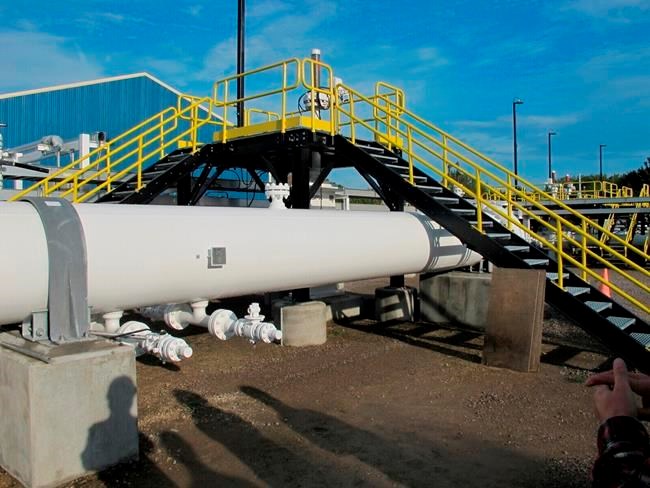WASHINGTON — The federal government and Enbridge Inc. are trying to exploit a "dormant" and outdated treaty with the United States to forestall the shutdown of the Line 5 pipeline, human rights and environmental groups argue in new court documents.
The argument comes from a recent flurry of filings in district court in Wisconsin, where the energy transmission giant is locked in a battle with a U.S. Indigenous band over the future of the cross-border conduit.
Several take direct aim at a central element of the company's defence: a 1977 treaty between Canada and the U.S. that was designed to prevent interruptions in the flow of oil and gas between the two countries.
Regardless of international treaties, the U.S. is obliged to defend the rights of Indigenous Peoples, which include the self-management of their natural resources, the Center for International Environmental Law argues in one such filing.
"In light of the pipeline's manifold risks … Line 5's continued operation would contravene the United States' duties to protect the right to life of Indigenous communities," it reads.
"If the pipeline treaty forces the United States to abandon environmental regulation and actively seek to ensure the pipeline's continued operation in spite of these grave risks of harm, it would require the United States to breach its duty to ensure fundamental human rights."
Both Calgary-based Enbridge and the Bad River Band of the Lake Superior Chippewa are appealing a district court decision in June that gave the company three years to remove the line from the band's Wisconsin reservation.
The collection of amicus briefs filed last week also includes one from Michigan Attorney General Dana Nessel, who is locked in a separate appeals court dispute of her own over Line 5, which crosses the Great Lakes below the Straits of Mackinac.
Nessel and the state have been trying to get the pipeline shut down since 2019, fearing an anchor strike or similar accident that could foul one of the most ecologically delicate regions in the northeastern U.S.
In her brief, Nessel agrees that Enbridge's treaty argument doesn't hold water, simply because nothing in the treaty itself expressly prevents governments or the courts from upholding human rights.
"Enbridge and Canada essentially argue that the 1977 treaty allows Enbridge to trespass indefinitely on someone else's land — sovereign land at that — and deprives the landowner of any recourse," she writes.
"This argument is without merit, has no basis in the text of the treaty and is offensive to the fundamental rights of sovereign governments and property owners."
In its own appeal brief, Enbridge argues that the treaty's "footing of supremacy" is the same as the U.S. Constitution, and that it prevents "impeding, diverting, redirecting or interfering with in any way the transmission of hydrocarbons in transit."
Line 5, which has been operating along the same route since it was built in 1953, carries some 540,000 barrels of oil and natural gas liquids each day across Wisconsin and Michigan to refineries in Sarnia, Ont.
It supplies key refining facilities in Ontario and Quebec, and is vital to the production of jet fuel for major airports on both sides of the Canada-U.S. border, including Detroit Metropolitan and Pearson International in Toronto.
Enbridge and its allies say a shutdown would cause major economic disruption across the Prairies and the U.S. Midwest, where the pipeline provides feedstock to refineries in Michigan, Ohio and Pennsylvania.
Nessel — whose state has devoted "substantial resources" to studying and assessing the risks posed by Line 5 — doesn't buy that argument, either.
"These extensive efforts have demonstrated to the state of Michigan's satisfaction that markets will ably adjust to a court-ordered shutdown of Line 5, and that Michigan is well-positioned to manage any impacts," she argues.
"These efforts have convinced the state of Michigan that any impacts associated with a shutdown of Line 5 are far outweighed by the grave risk of irreparable environmental and economic harm posed by its continued operation."
Enbridge, which is still seeking regulatory approval for a 66-kilometre detour around the reservation, fears three years won't be enough time to get it up and running. The company also insists that a 50-year agreement signed with the band in 1992 entitles it to keep the existing line open.
The band, however, wants the 19 kilometres of pipeline on its territory shut down as soon as possible, and is also disputing terms of the financial award and profit-sharing agreement that accompanied the district court ruling.
To that end, a separate filing by two U.S. experts on restitution law argues that District Court Judge William Conley erred when he calculated that agreement, which included a $5.1-million back payment.
Law professors Caprice Roberts and Doug Rendleman argue that Conley's finding accomplishes neither of the necessary goals of restitution: undoing unjust enrichment and deterring future opportunism.
They say the award comprises less than 0.3 per cent of the net profits — $1.1 billion, by their calculations — Enbridge collected from Line 5 over the course of the 10 years that the company was found to be trespassing on band territory.
"Restitution measures a wrongdoer's gain, rather than a victim's loss," Roberts and Rendleman write. "By turning a blind eye to its ongoing trespass, Enbridge was able to reap considerable profits by continuing to operate Line 5."
They also conclude that Enbridge saved an additional $296 million in profit when it opted in 2013 to defer the rerouting project, and suggest such a figure would represent a more appropriate remedy.
The U.S. Court of Appeals for the Seventh Circuit has yet to establish a schedule for oral arguments.
This report by The Canadian Press was first published Oct. 23, 2023.
James McCarten, The Canadian Press

